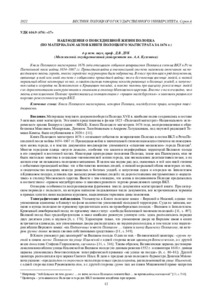Please use this identifier to cite or link to this item:
https://elib.psu.by/handle/123456789/28981| Title: | Наблюдения о повседневной жизни Полоцка (по материалам актов Книги Полоцкого магистрата за 1676 г.) |
| Authors: | Дук, Д. В. Duk, D. |
| Other Titles: | Observations on the Everyday Life of Polotsk (According to the Matirials of Polotsk Magistrate’s Book of Acts For 1676) |
| Issue Date: | 2022 |
| Publisher: | Полоцкий государственный университет |
| Citation: | Дук, Д. В. Наблюдения о повседневной жизни Полоцка (по материалам актов Книги Полоцкого магистрата за 1676 г.) / Д. В. Дук // Вестник Полоцкого государственного университета. Серия A, Гуманитарные науки. - 2022. - № 1. – С. 12-20. |
| Abstract: | Книга Полоцкого магистрата 1676 года описывает события возвращения Полоцка в состав ВКЛ и Речи Посполитой после войны 1654–1667 гг. Прошедшая война в значительной степени наложила отпечаток на повседневную жизнь города, многие городские территории были заброшены. В книге представлен ряд документов, связанных в той или иной степени с событиями прошедшей войны: это и бесчинства военных людей, и низкий моральный облик некоторых из них, и свидетельства пожарищ некогда развитых и богатых усадеб, и запустения садов и огородов на Заполотском и Кривцовом посадах, а также память про высылку ремесленных людей с их дорогостоящими инструментами и станками в столицу Московского царства. Вместе с тем очевидно, что жизнь в послевоенном Полоцке продолжалась в соответствии с «правом магдебургским» и законами развитого торгово-ремесленного центра ВКЛ.= The book of the Polotsk Magistrate of 1676 describes the events of the return of Polotsk to the Polish – Lithuanian Commonwealth after the war of 1654 – 1667. The last war largely left its mark on the daily life of the city, many urban areas were abandoned. The book presents a number of documents related to the events of the last war to one degree or another: these are the outrages of military men, and the low moral character of some of them, and evidence of the fires of once developed and rich estates, and the desolation of gardens and vegetable gardens in Zapolotsky and Krivtsovo posad, as well as the memory of the expulsion of artisan people with their expensive tools and machines to the capital of the Moscow Kingdom. At the same time, it is obvious that life in post-war Polotsk continued in accordance with the "Magdeburg law" and the laws of the developed trade and craft center INCL. |
| URI: | https://elib.psu.by/handle/123456789/28981 |
| metadata.dc.rights: | open access |
| Appears in Collections: | 2022, № 1 История и археология Полоцка и Полоцкой земли в IX-XVIII вв. |
Items in DSpace are protected by copyright, with all rights reserved, unless otherwise indicated.
